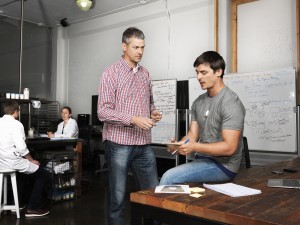It could be referred to as The Foodie Movement, this growing American interest in what we put in our bodies. Consumers obsess over super foods, name check the farms where they get their beef, make celebrities out of chefs. According to 2012 statistics from the National Association for the Specialty Food Trade, 53% of US adults regularly watch cooking shows and 76% enjoy talking about new or interesting foods. It was only a matter of time before investors started taking notice. Food technology, be it in the form of lab-engineered edibles, rooftop urban gardens or smartphone-operated farming apps, has found notable patronage in the world of venture capital.
Some of these venture-backed food production companies tow the purist line. Blue Bottle Coffee, backed by True Ventures, offers organic, artisanal coffees roasted on vintage equipment and shipped in compostable packaging. Unreal Candy, backed by Khosla Ventures, makes candy that’s free of corn syrup, chemicals and GMOs. But other companies are serving up some serious innovation, creating alternative foods to please patrons who are looking for options that are healthier, animal-free or more sustainable. Khosla Ventures also backs Nu-Tek Salt, which produces a reduced-sodium salt replacement, and Hampton Creek Foods, which engineers egg alternatives.

Josh Tetrick and Johan Boot talk in the Hampton Creek Foods lab.
“Right now our food system is really broken,” says Josh Tetrick, CEO and founder of Hampton Creek Foods. “Our goal is to make our food system much more sustainable and much more affordable for a world that’s going to have nine billion people by 2050.”
Tetrick’s company has trained its focus on one area of this broken system: global egg production. Tetrick says the current system of egg production is “fairly devastating” to the environment, and that his company has used its egg substitute to create a mayonnaise and a cookie dough that taste indistinguishable from the real thing. It is this kind of innovation that venture capitalists appear to be hungry for.
“The food industry is massive, so it’s a huge market. And when you have a huge market you have the opportunity to make a lot of money,” Tetrick says of the burgeoning VC interest in companies like his. “Secondly, the food industry is really deprived of innovation, and these VCs are looking to invest in innovation. They want to leapfrog the current system, the status quo.”
VC firm Kleiner Perkins Caufield & Byers (KPCB) has invested in Beyond Meat, which creates soy-based replicas of chicken strips; VoloAgri, which focuses on innovation in vegetable seed; and Harvest, Inc., which deals with food waste.
“In more developed markets, the consumer is increasingly more in tune with the source, quality, safety and nutrition in their food,” says Amol Deshpande, partner at KPCB. “This is providing opportunity for entrepreneurs to innovate and win market share quickly.

Hampton Creek Foods Vegan Vagrant
Hampton Creek Foods says that taste testers have been pleased with their products, and Beyond Meat reportedly engineers a poultry alternative that’s quite convincing. But with food evangelists like Michael Pollan calling for people to eat only items that their great-grandmothers would recognize as food, and on-trend eateries serving up herbs and produce grown on their own rooftops, what will those in the food world say about edible items that are engineered in a laboratory? Though rustic, farm-to-table types may frown on these creations, they may find support among a sector of chefs that has made its name by fusing food and science: the molecular gastronomists.
Those who count themselves among this dining sub-discipline use unique and often highly technical methods to create things like vinaigrettes spherified with calcium chloride and bisques flash frozen with liquid nitrogen. Chef Homaro Cantu of Chicago’s Moto restaurant is one of these food world mad scientists and he believes in what he calls an “organic-scientific approach”. He uses these creative techniques to manipulate pure, local ingredients — many of which are grown in an indoor farm within his restaurant.
“We need to invest in food and explore what’s possible,” Cantu says. “Imagine if companies like IBM and Xerox PARC never invested in exploring the microchip. We wouldn’t have smartphones. Without investment, we will discover nothing is possible. The same old thinking yields the same old results.”